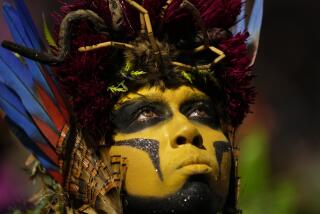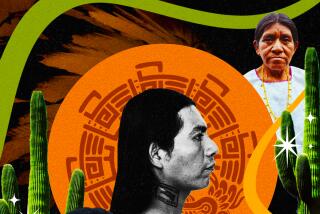Sprawl May Swallow Brazil Tribe’s Customs
- Share via
SAO PAULO, Brazil — Children jostle into the village schoolhouse, chattering happily in Guarani. For Giselda Jera, it’s the sound of her people’s past -- and their uncertain future.
Jera, 21, is a teacher in Morro da Saudade, the largest of three surviving Indian villages on the outskirts of Sao Paulo, South America’s biggest city. They are home to about 1,000 Guaranis, who are struggling to preserve their culture against the advance of Western civilization.
Just 35 miles away, downtown Sao Paulo bustles in a cosmopolitan sprawl of luxury high-rises, malls, theaters and hotels. With a metropolitan population of 18 million, the city has nearly reached the village gates.
“I am very worried about our future as a people,” Jera said. “We have succeeded in keeping our language and customs alive, but our lifestyle is in danger because we no longer have enough room to hunt, fish or plant sufficient corn, manioc and sweet potatoes the way our grandparents did.”
A mile from the nearest paved road, Morro da Saudade -- Portuguese for Hill of Wistfulness -- is easy to overlook. Only a sign on a dirt road saying “Indigenous Area” indicates that the village is near.
Chickens and scrawny dogs wander among the 100 squalid huts of wood, mud and tin. A few banana trees and tiny plots of corn, manioc and beans barely provide 136 families with enough to survive.
Children in shorts and flip-flops chase a ball across the packed red dirt of a village clearing. Except for the thatch-roofed prayer house and “maloca,” or community center, the scene isn’t very different from a Sao Paulo shantytown.
Jera remembers her grandfather spinning tales of hunting and fishing in the surrounding forests. Today, the trees are dwindling, the game is gone, and many young Guaranis are abandoning the village and traditional customs.
“White men started to settle this region about 30 years ago, cutting down trees and vegetation to build their homes and destroying our means of survival,” said the school’s principal, Kwaray Mirim.
It’s a common plight for tribes in Brazil’s developed south. Today, most of the nation’s 345,000 Indians live in the remote Amazon jungle, where less contact with the modern world makes it easier to preserve traditional ways.
The Guarani tribe is the largest of Brazil’s 215 indigenous groups, with about 35,000 members living in the cities, forests and coastal areas of seven states.
A peaceful, semi-nomadic people, the Guarani arrived in this region nearly half a century ago and roamed freely over hundreds of acres.
But in 1984, the government confined them to a 62-acre reservation “that is too small for them to lead a dignified life,” said Cristina Alves of the National Indian Affairs Bureau.
Still, residents consider the area a “Tekoa” -- Guarani for a good place to live -- and don’t want to leave. But Sao Paulo keeps expanding as poor migrants from Brazil’s arid northeast come in search of jobs and settle on the city’s edges.
“The rapid growth of these settlements forces the city government to pave roads, provide public transportation, electricity and other utilities, which in turn attracts more people to the region,” said Mauricio Fonseca of the Indigenous Peoples’ Support Program.
Urban civilization now threatens to engulf the reservation and the Guarani, he said. A commercial center, where Indians buy food and other goods they use to provide for themselves, is barely 6 miles away.
“With the exception of the handicrafts they sell in the city, the Guarani have been deprived of their traditional methods of self-sustainability,” Fonseca said. “If they cannot hunt, fish and plant enough crops, the material aspects of their culture will disappear and endanger the survival of their cultural and spiritual traditions.”
Sustained by donations from humanitarian groups and a government stipend of about $50 a month per family, the Guarani are striving to keep their traditions.
Young children are taught Guarani history and religion.
Vandeli Karai, a village elder, said the tribe’s only hope is to expand the reservation.
“If we get more land, perhaps we will be able to recover the kind of lives our forefathers once enjoyed,” he said.
More to Read
Sign up for Essential California
The most important California stories and recommendations in your inbox every morning.
You may occasionally receive promotional content from the Los Angeles Times.













